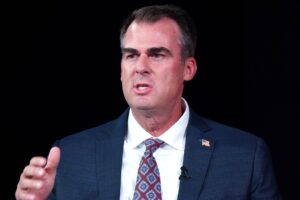Nex Benedict was sixteen years old. Like many smart and ferociously curious kids, Nex enjoyed reading and drawing. They were into Minecraft and The Walking Dead. Nex was part Choctaw and had a loving cat named Zeus. They earned straight As.
In any sane and tolerant world, Nex would have blossomed into adulthood. In all likelihood, they would have lived a rich and meaningful life.
But that didn’t happen. Nex Benedict is now dead.
Nex Benedict is dead — needlessly dead, unpardonably dead, heartbreakingly dead — because they were nonbinary and lived in Ossawo, Oklahoma — a hotbed of hate and intolerance in which cruel, unrepentant, and opportunistic sociopaths like Ryan Walters (of which more anon) gleefully cranked up the temperature and brought out the most savage and hotheaded elements in its otherwise law-abiding population.
While the precise cause of death is still being investigated (according to a Facebook statement from the police department), what is indisputable is this: (1) There was a violent altercation in the Ossawo High School girl’s bathroom. (2) Nex Benedict suffered significant injuries from other girls as a result of this incident. (3) Despite Nex’s injuries, the school did not call an ambulance service for Nex. (4) It was recommended by the school nurse that Nex visit a medical facility. (5) The next day — February 8, 2024 — the Ossawo Fire Department were dispatched for a medical emergency, which resulted in Nex being conveyed to the St. Francis Pediatric emergency room, where Nex then died.
Ossawo, Oklahoma is a community of 38,732 people in which someone erected a “Let’s Go Brandon” billboard on US 169 near the 76th Street North exit and in which Alee McLain — a right-wing fanatic who is the admin of the Owasso Area Republican Women’s Club Facebook page — falsely accused Oklahoma Labor Commissioner Leslie Osborn of encouraging an environment in which children were sexually groomed. (Osborn is a Republican who had been on the board of directors of Honestly, which focused in part on “youth sexual health.” Like many histrionic Republicans fond of using their deranged imagination to invent mythical dens of iniquity from pizza parlors, McLain bought into a conspiracy conjured up by the Oklahoma City Republican Women’s Club without question. It didn’t take long for the hateful froth to foam from the dank corners of her mottled mouth on cue.)
Oklahoma is a state in which cruel, hateful, and unremarkable bigots like Ryan Walters inexplicably become the State Superintendent of Public Instruction and enact callous policies that create intolerant impressions that kids pick up on.
Adults — particularly those who are far enough removed from childhood to forget how impressionable they once were — often ignore the reality that kids (and these kids, much like McLain, can sometimes be as old as fifty-five years old) pay close attention to what they say.
Walters undoubtedly knew this when he fomented hate and transphobic sentiment in his capacity as a public official last year. On June 29, 2023, Walters released a bigoted video on the Oklahoma State Department of Education YouTube account in which he declared:
And there’s dangerous consequences [sic] when common sense is vacated. And we’ve seen, we see a district here in the state where a boy was allowed to go into the girl’s restroom and assaulted two young girls there.
There was just one problem. Aside from misgendering a girl with his insufferably pompous illiteracy, Walters got the facts wrong.
Walters was referring to an October 26, 2022 incident at Edmond Public Schools in which a trans girl got into a physical dispute with a cisgender girl in a girls bathroom. But, as Assigned Media has reported, the details from the two girls are contradictory and murky. The right-wing “news” outlets that covered this incident made no effort to get the details from the trans girl’s perspective. The most neutral news story that Assigned ferreted out was, improbably, the conservative Washington Examiner — where the injuries in question were reported as “minor.” (It is also important to note that Edmond Public Superintendent Angela Grunewald — targeted by Walters in his unhinged state-sanctioned hate speech — was careful to observe, “We don’t want a student hurt at all, whether minor or serious.”)
Unlike this embellished Edmond case, the Ossawo, Oklahoma bathroom incident involved a trans girl who was victimized for being gender-fluid and who is now dead. And because Ryan Walters cannot perceive any LGBTQIA person as a human being — whether adult or child — a glimpse at Ryan Walters’s X/Twitter account reveals no statement expressing even a pro forma “thoughts and prayers” for Nex’s death. In other words, Walters is such an indecent monster, one so riddled with fury and intolerance, that he cannot even engage in the standard cosplay concern one sees from indifferent right-wingers after the latest mass shooting. He has, however, offered more lies, including the risible suggestion that Edmond Public Schools “embraces porn” (the books in question were The Kite Runner and The Glass Castle, which are both no more pornographic than someone wearing shorts on a hot summer day, as well as a baffling intolerance for drag queens. (Here are some interesting statistics from the squeaky-clean data wranglers at Gitnux: There are an estimated 6,100 drag queens in the United States. Approximately 72% of drag queens encountered some form of prejudice or discrimination in 2019. Walters then is clearly more of a force promoting intolerance rather than fighting it.)
Walters was motivated in large part by noted gubernatorial hatemonger Kevin Stitt — a 51-year-old man whose pitch-black hair and permanent scowl bears an uncanny resemblance to the inert and incinerated cilia in a lifelong smoker’s lungs.
On May 25, 2022, Governor Stitt signed one of the most transphobic laws on the books, requiring students at schools to produce their birth certificates for inspection and use the gender listed on that as the basis for what restrooms and locker rooms to use. (This followed a move by Stitt to ban a nonbinary gender marker on all birth certificates issued in Oklahoma.)
Walters naturally followed in these baleful footsteps like an eager bottom.
And because of this, Nex Benedict — a promising student — is now dead.
In all likelihood, Nex would not be dead if Stitt had not signed this bill into law and if Walters had not published his vile video on YouTube. It is almost certain that if these bigots had not pushed so hard and callously with their demagoguery, the people of Oklahoma would have eventually learned greater LGBTQIA tolerance, perhaps codified by state law.
But it seems that Walters and Stitt are more interested in being on the wrong side of history, much as Tulsa was on the wrong side of history in 1921. Keep in mind that Oklahoma is a state in which, just last year, the Sheriff of McCurtain County and several officials expressed a desire to string up Blacks and murder journalists. And while hundred of valiant and principled Oklahomans protested outside the Sheriff’s Office, the racist Sheriff still kept his job.
Now that blood is on Ryan Walters’s hands, the question is whether Ryan Walters will keep his job. His term ends in 2027 and, with xenophobia happening so fast, that seems too far away. There is a movement to impeach him. There have been floods of comments. But Walters will still continue to spout forth piss like some Speer-inspired fountain installed in 1930s Berlin. How many kids have to be brutalized before the people of Oklahoma decide that there is no place in their state for hate and death?



